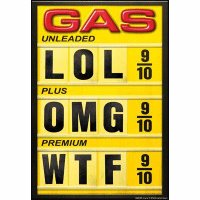
I don't think he is, first of all. Even if he was, the oil companies in this country don't control the price of a barrel of oil, they control the price of the end product. Overall consumption, rather, is the primary reason for the rise in oil company profits. The rise in large engine vehicles, like my Blazer (which I'm hoping to get rid of when I pay it off), and the explosion of the Chinese economy have led to this "problem".
If this was all just gouging, ask yourself this - why wouldn't one of the few smaller companies take the initiative to drop the bottom out of their prices, and generate a higher volume of business? The answer is, they can't.
This brings me to the purpose for this post. I've been reading alot lately how the Federal Government should levy a Windfall Tax on "Big Oil", due to its record profits. Some are even arguing that this would somehow lower the price of gas. Personally, I would like to know how causing a company to make less money per unit sold would cause them to lower prices, and not raise them to cover the difference. Lowering prices would only cause the company to make lower profits, likely causing them to shed corporate weight in the form of employees. That, of course, would not be very good for the economy. Combine that with doubting that this would lower prices, and I don't see any way this could possibly help the consumer.
This argument is oddly isolated to the oil industry, because we've enjoyed years of relative easy access to fuel that has now increased in price in almost absurd fashion. Consider this - when perusing the list of America's Most Profitable Companies, you see names like Wal-Mart, Home Depot, and Microsoft alongside those evil oil companies.
Are we to punish them for their excesses, too? Companies like Microsoft, IBM, Cisco, and Intel sell products crucial to most businesses day-to day operations. Those businesses then have to find a way to recoup to cost of those products in their end product or service...and also turn a profit to remain solvent. You could argue that IT companies turning record profits does more to effect our cost of living than gas. Those companies, however, don't have to post an adjustable product price in front of their building everyday.
We need to remember that the market will correct itself, as it always does...without the Federal Government's heavy hand. Auto makers are ramping up efforts to market and sell alternative fuel cars, and we are starting to think twice about buying the next Ford Expedition. It may suck right now, but in the long run, our economy, and environment, will be the better for it.




